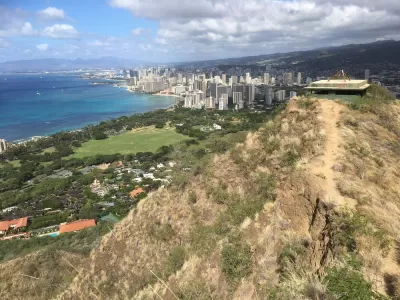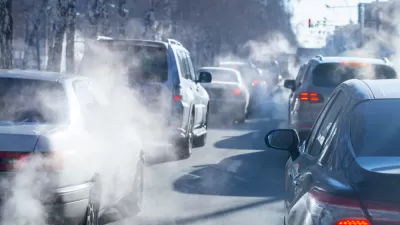A group of Hawai’ian youth is suing the state’s Department of Transportation, claiming that Hawai’i’s transportation system contributes to climate change and the destruction of homes and cultural traditions.

Kids and teens in Hawai’i are taking action on climate change by suing their state, reports Kea Wilson in Streetsblog. “Earlier this month, a coalition of young Hawaiian climate leaders ranging in age from 9 to 18 years old sued the Hawai‘i Department of Transportation and its director, plus Gov. David Ige, for the harm caused by the ‘active operation of a transportation system that results in high levels of greenhouse gas emissions, [which] is causing significant harm to their communities, violates their constitutional rights, and undermines their ability to ‘live healthful lives in Hawai’i now and into the future.’’”
“Across a sprawling 70-page suit, the children and teens described the harrowing traumas they’ve endured as a direct result of climate change, including the loss of their homes in catastrophic floods, the extended closure of critical roadways that have impeded their basic mobility, and the destruction of the beaches and ocean ecosystems that are deeply important to Hawaiian life.”
Andrea Rodgers, senior litigation attorney at Our Children’s Trust and co-counsel for the youth plaintiffs, “emphasizes that for the state of Hawai‘i to fulfill its legal obligation to its children and teens, policymakers and DOT leaders may not actually need to chart a radically different approach. They’ll just need to fund and implement the carbon-cutting strategies that they’ve already outlined, instead of ignoring them and building endless lane miles for drivers instead.”
Rodgers hopes that if the group is successful, the case could inspire a similar movement in other states.
FULL STORY: Why Kids are Suing DOTs for Driving the Climate Crisis

Planetizen Federal Action Tracker
A weekly monitor of how Trump’s orders and actions are impacting planners and planning in America.

Chicago’s Ghost Rails
Just beneath the surface of the modern city lie the remnants of its expansive early 20th-century streetcar system.

San Antonio and Austin are Fusing Into one Massive Megaregion
The region spanning the two central Texas cities is growing fast, posing challenges for local infrastructure and water supplies.

Since Zion's Shuttles Went Electric “The Smog is Gone”
Visitors to Zion National Park can enjoy the canyon via the nation’s first fully electric park shuttle system.

Trump Distributing DOT Safety Funds at 1/10 Rate of Biden
Funds for Safe Streets and other transportation safety and equity programs are being held up by administrative reviews and conflicts with the Trump administration’s priorities.

German Cities Subsidize Taxis for Women Amid Wave of Violence
Free or low-cost taxi rides can help women navigate cities more safely, but critics say the programs don't address the root causes of violence against women.
Urban Design for Planners 1: Software Tools
This six-course series explores essential urban design concepts using open source software and equips planners with the tools they need to participate fully in the urban design process.
Planning for Universal Design
Learn the tools for implementing Universal Design in planning regulations.
planning NEXT
Appalachian Highlands Housing Partners
Mpact (founded as Rail~Volution)
City of Camden Redevelopment Agency
City of Astoria
City of Portland
City of Laramie





























